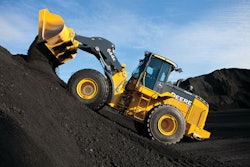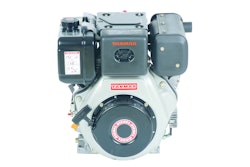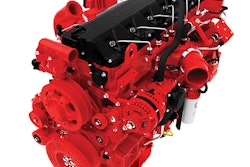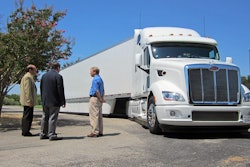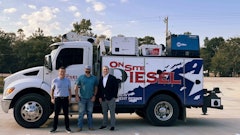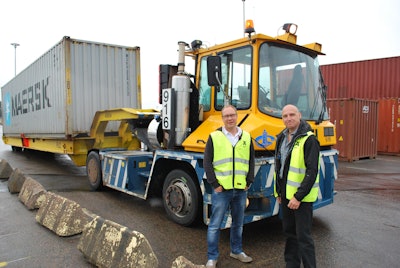
It’s all well and good to put an engine prototype through its paces in a test cell. But it’s even better if the engine goes to work in tough real-life conditions. That’s why Volvo Penta has its new Stage IV/Tier 4 Final engines under test in the demanding roll-on/roll-off industry at Älvsborg Roro, operating in the Port of Gothenburg.
The Port of Gothenburg in Sweden is Scandinavia’s largest and busiest port, logging more than 11,000 vessel calls per year, with ships coming and going from countries like the Netherlands, Germany, the UK and Denmark.
Last year saw over 530,000 wheeled cargo ‘roll-on/roll-off’ (roro) units pass through the port, more than half of which were handled by Älvsborg Roro, a company specializing in roll-on/roll-off cargo in trailers and railroad cars, as well as automobile handling. In its terminal area, which covers a half million square meters and encompasses seven roro berths, Älvsborg Roro works around the clock to move trailers and containers on and off ships or into temporary storage — to the tune of over 10 million tons of cargo each year, primarily paper but also steel and specialized goods.
Assisting Älvsborg Roro’s 280 employees is a diverse fleet of machines, including four reach stackers, three special oversized straddle carriers, a handful of forklifts and around 60 tug masters and terminal tractors. It goes without saying that in such a non-stop environment, machine uptime is vital.
Älvsborg Roro has an ongoing relationship with Volvo Penta, whose engines are installed in around half of its machines. Because of the demanding nature of the work, Volvo Penta has long used Älvsborg Roro as a testing ground for its engines, including the new Stage IV/Tier 4 Final engines that are set to hit the market in 2014.
“We can run a new engine in a test cell, but it’s better to test our engines in reality — in vehicles and machines that are working hard day [in] and day out, in tough conditions in the field,” says Björn Nilsson, a Volvo Penta test engineer who specializes in field tests and quality — and who works closely with Älvsborg Roro.
In the field
Field testing makes it possible to record the engine’s activity in the vehicle over an extended period of time before repeating it in a test cell, so that engineers can fully understand how well the engine is performing. It is seen as one of the best ways to identify any weaknesses or problems before the engine goes to market.
Volvo Penta began testing its Stage IV/Tier 4 Final D8 engine in a MAFI terminal tractor at Älvsborg Roro in February this year. Field tests usually run for 12 months, and Nilsson expects the terminal tractor to put in around 2,000 hours during that time. So far the Stage IV engine is showing lower fuel consumption, higher torque and better performance than previous engine generations. Once the field test is finished, the engine will go back to Volvo Penta where the engineering department will disassemble it to more closely investigate its wear and tear.
For Volvo Penta, having a test site in its back yard — the Port of Gothenburg is only 6 km away from Volvo Penta’s head office — allows it to do ample follow-up to determine how much oil, urea and fuel the engine is using and whether it is having any problems with temperature regulation.
Älvsborg Roro’s terminal at the Port of Gothenburg is also ideal for field testing because of its harsh conditions: around-the-clock operating hours, steep inclines, uneven surfaces and a location on the sea. “The engine would have an easier life elsewhere,” says Anders Hedlund, who works with technical engineering at Älvsborg Roro. “It’s tough here, and we make great demands of our equipment.”
Älvsborg Roro agreed to the test because it is driven by the need to lower fuel consumption, as well as a desire to be as environmentally friendly in its operations as possible. The city has stipulated that machines working in the Port of Gothenburg cannot run anything less than Stage IIIB engines as of January 1, 2015. The company is in the process of switching out its older engines now.
“Being a field test site allows us to get access to new technology in its early stages,” Hedlund says. “Älvsborg Roro and Volvo Penta have an interest in common: to improve the technology for the future. This is how we do it.”




